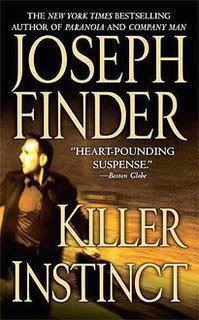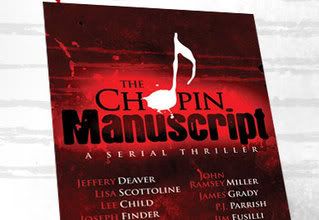AUTHOR INTERVIEW: Joseph Finder, part 2
By Kathleen Bolton | January 11, 2008 |
 Author Joseph Finder‘s formula for success centers on delving into the seedy side of corporations and turning the decidedly unglamorous institutional setting into nail-biting thrillers. His books have touched a chord among readers who instantly recognize the problems and the stakes associated with those who work for big bureaucracies, their web of rules, rule-breaking, and ever-present personality conflicts.
Author Joseph Finder‘s formula for success centers on delving into the seedy side of corporations and turning the decidedly unglamorous institutional setting into nail-biting thrillers. His books have touched a chord among readers who instantly recognize the problems and the stakes associated with those who work for big bureaucracies, their web of rules, rule-breaking, and ever-present personality conflicts.
Though writing about a book a year has kept Finder at the top of the bestseller lists, he reveals what all writers know: it’s not as easy as it looks.
We are pleased to present part two of our interview with Joseph Finder. Missed part one? Click HERE.
Q: What’s your drafting process? Do you plot extensively before writing, or let it evolve organically?
JF: I’ve tried it both ways. With Power Play, I started with the characters and the premise and very little plot worked out, and it ended it up taking me months longer than it should have: I wasted all kinds of time writing scenes that didn’t belong, going down blind alleys. So I’ve learned to plot, but not overplot. That is, I need to figure out the major “beats” or plot points, and I need to know how it’ll end, and I need to have a good sense of my main characters. Then I start writing, and I let myself develop characters as I write, change the plot if needed, do course corrections.
Q: You write mostly in first person POV. How do you determine which POV will work best for the story at hand?
JF: I love first-person — I think it establishes an intimacy with the protagonist you can’t get in most third-person narration. But it’s limiting — you can’t see what our hero’s antagonists are up to, for one thing. And it limits you to one character’s POV. That’s why, in COMPANY MAN, I wrote in 3rd — so we could be in both Audrey’s and Nick’s heads. In my new book I’m writing in third person so we can spend time with two protagonists.
 Q: You are one of 15 novelists participating in International Thriller Writers Association/Audible.com serial thriller THE CHOPIN MANUSCRIPT (we interviewed the editor, Jim Fusilli at WU in Sept. 2007). What drew you to the project? What was it like to pick up a plot thread that someone else had created, and what kind of pressure was there to leave a sustainable narrative for the person coming after you? Would you do something like this again?
Q: You are one of 15 novelists participating in International Thriller Writers Association/Audible.com serial thriller THE CHOPIN MANUSCRIPT (we interviewed the editor, Jim Fusilli at WU in Sept. 2007). What drew you to the project? What was it like to pick up a plot thread that someone else had created, and what kind of pressure was there to leave a sustainable narrative for the person coming after you? Would you do something like this again?
JF: It was hard, actually! I didn’t know what Deaver or the other writers before me had in mind with their characters or their planted clues — and maybe they didn’t either. But the aspect I focused on most of all was pacing. As much as I would have liked to have written an action scene, it felt to me, as a reader, that we’d had plenty of action — we needed to take a break in the action. So I wrote a quieter scene. I also wanted to amp up the feeling of conspiracy, the sense of enemies in high places. So I had to accomplish two things at once. I’d do it again with writers this talented, sure.
Q: Genre fiction accounts for the biggest share of the marketplace, yet receives so little respect in literary circles. Why do you think that is?
JF: That’s a very big and complicated question, hard to answer in a brief space. But there are all sorts of reasons. “Literary” writers are anxious about the “plottiness” of genre fiction mostly because contemporary literature has evolved as a reaction to plot. If you have too much plot, you’re not considered literary these days. Literary fiction in the last century became much more introspective, much more removed from the concerns of the mainstream. In the 19th century, there was no such distinction — there was fiction, pure and simple. That’s no longer the case. Now there’s popular fiction and there’s literary fiction . . . and frankly I think there’s a good deal of envy on the part of those literary writers who see the kind of sales pop novelists rack up and are therefore moved to denigrate them. But what I wish literary novelists would keep in mind is that the competition isn’t between genres of novelists; it’s between books and other forms of mass entertainment like TV, movies, and the Internet. And it’s better for us writers to keep people reading books, whether they’re highbrow or lowbrow or something in between.
Q: What’s your advice for aspiring authors?
JF: Be stubborn. I’m convinced that the writers who make it are not necessarily the most talented but the most determined.
Q: What are you reading now?
JF: An excellent thriller by the British thriller writer Simon Kernick called Relentless. And I just finished Sue Miller’s wonderful new novel, The Senator’s Wife. So I read pop fiction and literary novels too.
All of Finder’s titles are available at online retailers and bricks ‘n mortar stores everywhere. Finder is offering a limited number of signed copies of POWERPLAY, his latest thriller.









I loved his comment: “Be stubborn. I’m convinced that the writers who make it are not necessarily the most talented but the most determined.” That’s encouraging for every writer–and so true. Thanks for a great interview.
yes, that was empowering, wasn’t it? Also that he struggles with plotting even after writing several books.
Mmm… plot. ;)
Great interview! I appreciated his take on genre and literary fiction.